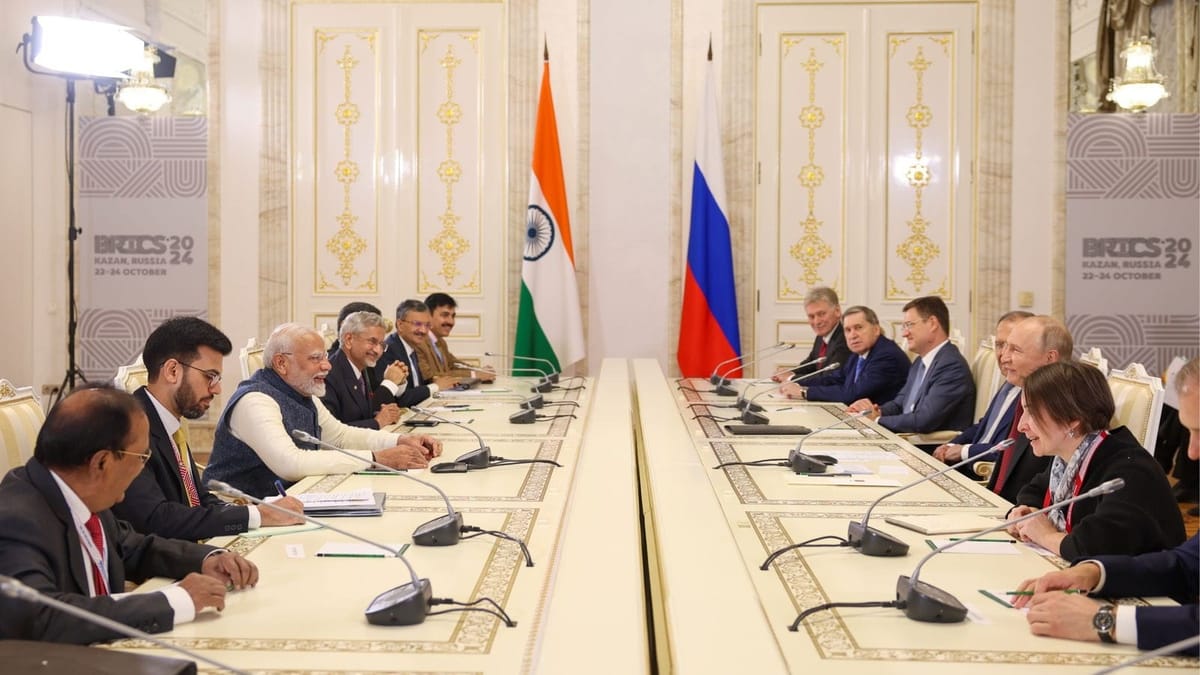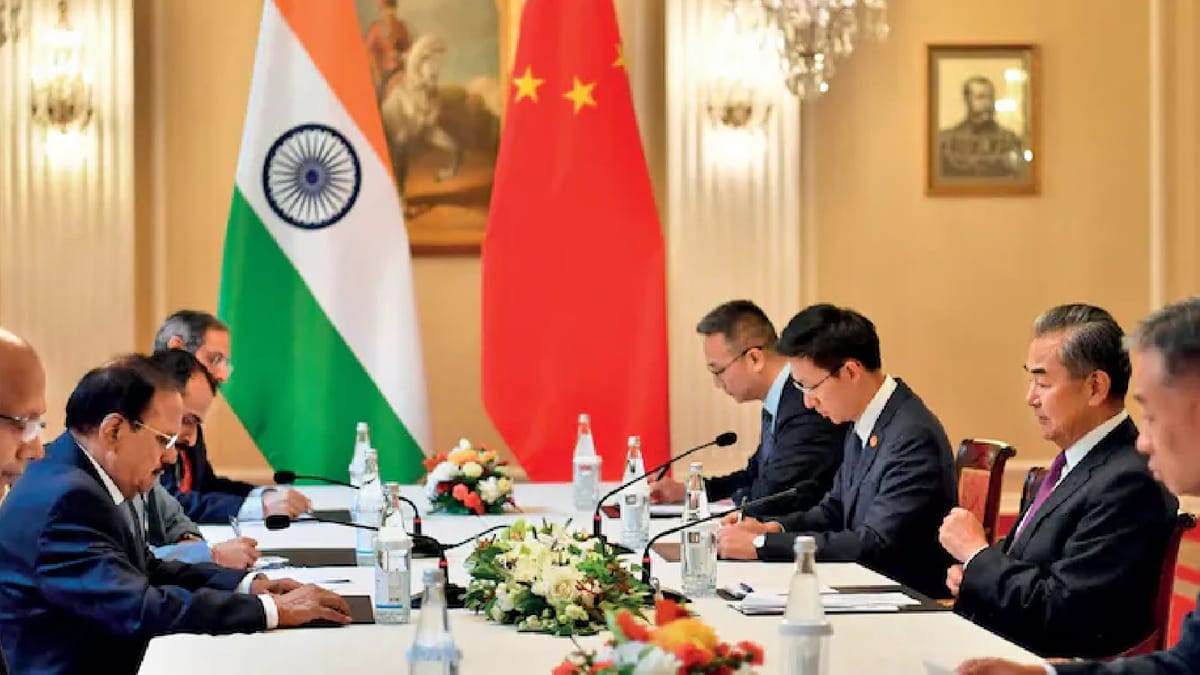
ModiWatch: Prime Minister Narendra Modi departed on Tuesday for Kazan to attend the BRICS Summit, aiming to strengthen India-Russia ties and discuss global development, economic cooperation, and resilient supply chains.
During a bilateral meeting with Russian President Vladimir Putin in Kazan, PM Modi reiterated India's call for a peaceful resolution to the Russia-Ukraine conflict and announced the opening of a new Indian consulate in the city.
PM Modi met Iran's President Dr. Masoud Pezeshkian in Kazan. Talks focused on the Chabahar Port deal and regional stability in West Asia.
Modi and Putin strengthen ties at BRICS Summit: PM Modi and President Vladimir Putin discussed cooperation across political, economic, defence, and energy sectors, with plans for the upcoming India-Russia Inter-Governmental Commission on Trade, Economic, and Cultural Matters in New Delhi in November 2024. Modi invited Putin to India for the Annual Summit next year, reaffirming their commitment to the Special and Privileged Strategic Partnership.
Infrastructure investments in Northeast
$162 million for Manipur highway projects: Ministry of Road Transport and Highways has approved $162 million for 50 National Highway projects in Manipur.
Gadkari pushes forward highway projects in Northeast: Minister of Road Transport and Highways Nitin Gadkari reviewed progress on 102 National Highway projects across Assam, Sikkim, and Mizoram, to accelerate infrastructure development and support economic growth.
Nagaland highways to drive regional growth: Minister of Road Transport and Highways Nitin Gadkari reviewed 29 National Highway projects in Nagaland, aiming for accelerated and sustainable development to strengthen regional connectivity and promote economic integration.
India's economic outlook
RBI Chief projects 7.2% GDP growth: Reserve Bank of India Governor Shaktikanta Das forecasts a 7.2% real GDP growth for 2024-25, driven by rising consumption and investment demand, while CPI (Consumer Price Index) inflation is projected at 4.5%.
IMF keeps India’s growth forecast steady: The International Monetary Fund (IMF) projects India’s economy to grow 7% this fiscal year and 6.5% in 2025-26, down from 8.2% in 2023.
Finance Minister highlights strong banking sector and infrastructure growth: Finance Minister Nirmala Sitharaman stated that India’s banking system remains robust with low non-performing assets and high capital adequacy ratios, while the country's infrastructure initiatives are pivotal in sustaining economic growth amid a challenging global environment.
Tourism sector set to double to $500 billion by 2029: Tourism Minister Gajendra Singh Shekhawat announced the organised tourism sector is projected to grow from $250 billion to $500 billion by 2029, positioning it as a growth driver for the Indian economy.
Oil prices expected to fall
Oil Minister predicts drop in global prices amid increased supply: Minister of Petroleum and Natural Gas Hardeep Singh Puri expressed optimism that global oil prices will decrease as more supply enters the market from countries like Brazil and Guyana.
Puri highlights India's energy transition: Minister of Petroleum and Natural Gas Hardeep Singh Puri outlined India's commitment to sustainable energy, noting a projected rise in energy consumption from 5.4 million barrels per day to 7 million by 2030, and highlighting initiatives like a leap in ethanol blending from 1.53% in 2013-14 to 16% today, with a target of 20% by 2025.
Ministry unveils plan to turn coal waste into construction material: Ministry of Coal has released a report on using overburden (OB) from coal mining to produce manufactured sand (M-sand), aiming to promote sustainability and economic development by reducing river sand dependency, generating revenue, and creating jobs through OB processing plants.
Dairy growth plan
Second white revolution: Home and Cooperation Minister Amit Shah announced plans to connect all 8 million milk-producing farmers to cooperative infrastructure and establish 200,000 cooperatives in the next five years, aiming to address exploitation and foster growth in the dairy sector, which is currently expanding at 6% annually.
India-China relations and regional security
China and India resolve Eastern Ladakh standoff: China has confirmed an agreement with India to end the military standoff in eastern Ladakh, with plans for future cooperation on border issues.
Army Chief says trust is vital for India-China disengagement: Army Chief General Upendra Dwivedi says rebuilding trust between India and China is crucial for facilitating disengagement, with the primary objective being a return to the April 2020 status quo.
Read the full story:
 Delhi BriefingDaanish Narayan
Delhi BriefingDaanish Narayan
Quad extends Cyber Challenge: India, the US, Australia, and Japan will continue the Quad Cyber Challenge for strengthening responsible cyber ecosystems.
India and Singapore strengthen defence ties: India and Singapore committed to deepening their defence cooperation and addressing regional security issues, reinforcing their Comprehensive Strategic Partnership.
India launches fourth nuclear submarine: India launched its fourth nuclear-powered ballistic missile submarine (SSBN), codenamed S4*, at the Ship Building Center in Visakhapatnam, featuring 75% indigenous content and armed with 3,500 km range K-4 nuclear missiles.
Kartarpur Corridor deal renewed despite $20 fee standoff: India and Pakistan have renewed the Kartarpur Corridor agreement for another five years, allowing Sikh pilgrims to visit the Gurdwara Darbar Sahib in Pakistan despite ongoing disagreements over the $20 (₹1,680) service fee.
India advances drone technology
ideaForge unveils India’s first app-based DaaS model: Indian drone technology firm ideaForge has launched the Flyght Franchise, an app-based Drone-as-a-Service (DaaS) model aimed at large enterprises. The service, which includes operational assistance and marketing support, has been utilised across states for applications such as public safety, infrastructure, and emergency response.
Andhra Pradesh aims to become India's drone capital: The Andhra Pradesh government plans to release its Drone Policy by November, training 20,000 individuals in drone operations across sectors.
Postal service tests drone mail delivery in Arunachal Pradesh: Department of Posts has begun a proof of concept for drone mail delivery in Arunachal Pradesh, cutting mail transmission time from 2.5 hours to 24 minutes between Chowkham and Wakro in partnership with Skye Air Mobility.
India launches system to block spoofed international calls: India's Department of Telecommunications (DoT) launched a system that blocks 13.5 million spoofed international calls within 24 hours, aiming to curb scams and cyber-crimes involving manipulated Indian phone numbers.
$1.2 billion defence hub
Reliance plans $1.2 billion defence manufacturing hub in Maharashtra: Reliance Infrastructure is set to invest $1.2 billion in a 1,000-acre defence manufacturing project in Ratnagiri, developing the Dhirubhai Ambani Defence City, with plans for joint ventures and export-focused arms and ammunition production.
Steel duties threaten competitiveness of Indian exporters: The Engineering Export Promotion Council (EEPC) of India cautioned that imposing additional duties on steel imports could hurt smaller firms and the Make in India push, as domestic production growth lags behind a 13.8% rise in demand, making affordable imports crucial.
Bomb threats disrupt 59 flights
Bomb threats disrupt flights across India: Bomb threats on social media disrupted at least 59 flights in India over two days. Most threats were deemed non-specific.
Supreme Court to rule on states' challenge to central control over industrial alcohol: A nine-judge Constitution Bench led by Chief Justice D.Y. Chandrachud will decide today whether the Centre retains exclusive control over industrial alcohol, contested by multiple states concerned about its conversion into illicit liquor and public health risks.
Delhi Today: Hazy.
Delhi air quality drops: Delhi's air quality index (AQI) hit 318 on Tuesday, marking a return to the 'very poor' category following the implementation of the second stage of the Graded Response Action Plan (GRAP) to combat pollution from local emissions and firecrackers.

